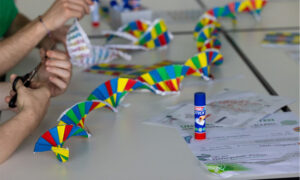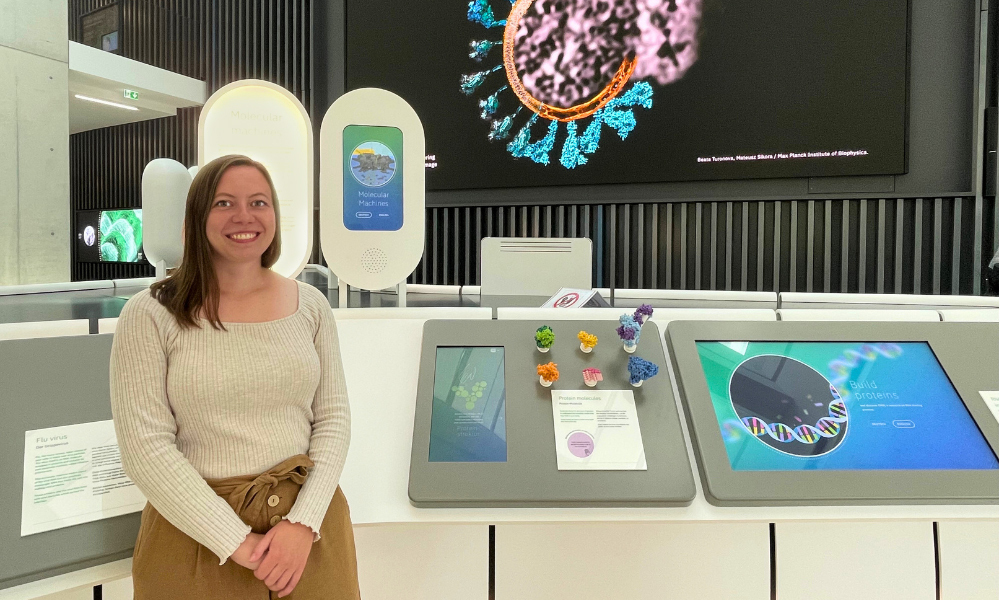
Read the latest Issue
Zuzana Koskova, Predoctoral Fellow in the Cuylen group, talks about her journey, experiences at EMBL Heidelberg, and recent participation in an Info Day in Bratislava, Slovakia

Zuzana Koskova is a PhD student from Slovakia who, at the age of 19, left her country to pursue her career in biological sciences in Germany. In this interview, she talks about her interests, career aspirations, and recent participation at the Info Day held in Bratislava, where she had the opportunity to connect with fellow nationals and share her experiences as part of the Cuylen group at EMBL Heidelberg.
I fell in love with EMBL during my Master’s thesis project in the Hentze lab in 2021. Although it was during COVID times, I was amazed by how stimulating and friendly the EMBL environment was. Initially, it wasn’t in my plans to stay here for my PhD as I had been in Heidelberg for five years at this point. I longed for more experiences abroad and after my Master’s degree, I decided to do two Erasmus internships at the Francis Crick Institute in London and at the Karolinska Institutet in Stockholm to decide where to move.
While I learned a lot during these internships, I missed EMBL a lot, and after these experiences, it was clear to me that the people, the collaboration between groups, the broad list of courses, and all the opportunities that EMBL offers were what I wanted for my PhD experience and I’m very happy to be back.
It’s exciting to explore and understand a small fraction of the nature of cells or molecules. No matter how small your discovery is, it still feels like your work pushes the collective knowledge of humanity a little bit forward. I’m also excited to learn new methods, to watch scientific stories develop over time, and to accept that what I learned at university is maybe no longer accurate. Additionally, I’m slowly getting involved in science communication, and I’m excited to tell the general public about what scientists do and maybe inspire a few people to be more interested in science.
I moved to Germany for my studies at the age of 19, so it wasn’t hard for me to get used to EMBL. It’s a great international environment of people who all left their home countries and are excited about research, so I feel at home here. I’d tell Slovak researchers that although projects can be challenging and excellence in the publications is expected, there are many benefits and opportunities that we can enjoy as part of EMBL. I would recommend everyone to give it a try.
It was a very valuable experience to represent EMBL in my home country. First of all, I learned a lot from the presentations of other representatives about all the opportunities for visiting scientists at the different laboratories. It was inspiring to see my fellow nationals’ passion for science and eagerness to connect. It made me realise that I should be grateful for the different opportunities that we have at EMBL. I truly hope that Slovak scientists start using even more the different EMBL services and funding available to advance their research and expand their networks through EMBL. They should know that they could always reach out to EMBL for advice.
I promoted the Winter recruitment for the EMBL International PhD Programme (EIPP), which is still open for a few more weeks. I also talked about the PhD symposium organised by my peers this year and I hope that some Slovak PhD or Master’s students will join. I shared my experiences as a PhD student and discussed all the great opportunities that EMBL has for young scientists interested in challenging projects. I also encouraged them to join and to explore what EMBL can offer.
It all depends on how my PhD experience turns out. For now, I would like to stay in academia, do a postdoc, and maybe become a group leader. However, I know that many PhD students change their minds over time, so I’m trying to come up with a Plan B and C. That’s why I started to get involved in lab sustainability, and science communication too.
In the first year of my PhD, I became a much more independent researcher and I hope I will only get better and better at navigating scientific projects and collaborations. I learned a lot of new techniques thanks to the genomics, microscopy, and flow cytometry core facilities. I joined some of the professional development courses and conferences too. It’s also incredible to watch new group leaders set up their own labs. It makes me realise that it’s really hard, but their drive and enthusiasm are inspiring.
On the non-research side, I joined the Green EMBL group to promote sustainability in the organisation. As for science communication and public outreach, I wrote an article about non-coding RNAs for the journal Science in School (currently in review) and I recently completed the training to be an occasional tour guide in the World of Molecular Biology exhibition at the Imaging Centre. These extra activities give me a lot of joy and they will help me expand my knowledge and interests beyond academia.
I remember being curious about the world hidden inside the cells during high school. I would ask many questions about DNA, RNA, and proteins, and read about it at home. I guess the eagerness to get the answers motivated me to dig deeper into molecular biology. But I don’t really know how it started. I remember finding an essay from when I was 15 and genetics or molecular biology was already written there as my dream job.
I’m trying to get back to some of my hobbies after neglecting them during my studies. I’ve gone back to reading books every day and doing puzzles occasionally. I’m also still looking for a good creative hobby, currently trying wood working after painting didn’t work that well. I’ve always liked hiking and travelling, and I also try to spend more time with my friends before we all disperse all around the world after our PhDs.
Looking for past print editions of EMBLetc.? Browse our archive, going back 20 years.
EMBLetc. archive